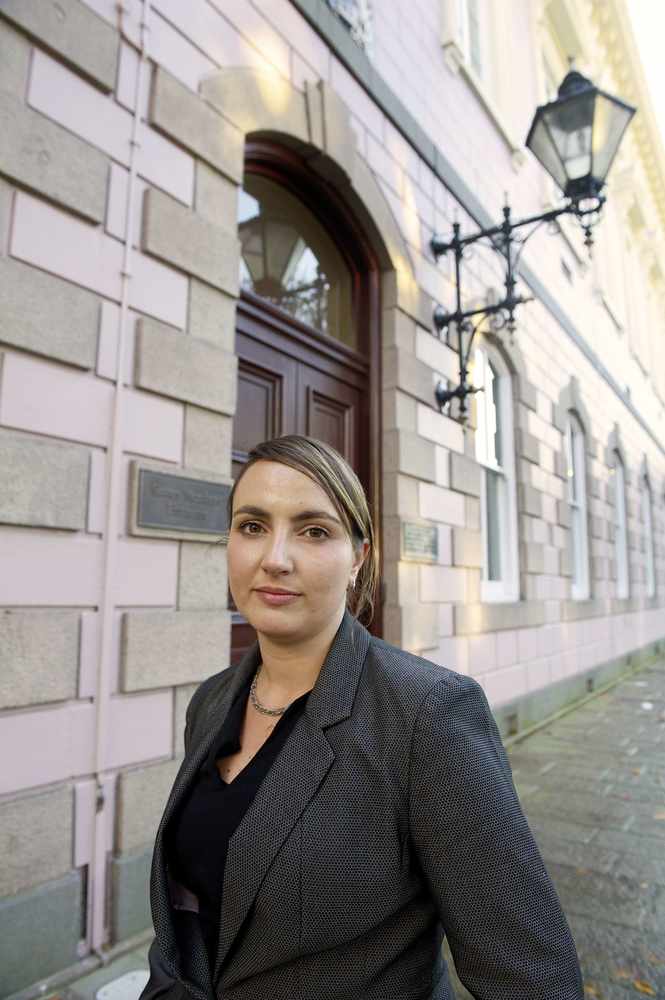It is a description that many of her colleagues will agree with, even if they do not always share her political views.
But during her seven years in the States the 32-year-old has got on with the majority of her work quietly and diligently, without causing a fuss or making headlines at any given opportunity.
Until this week, that is, when she handed in her resignation as Assistant Treasury Minister. She had had enough of, she says, being excluded, ignored and taken for granted, and she wanted Islanders to know it. The Deputy also thought that the public deserved to know just how disorganised she thinks the upper levels of government are.
‘I could have just sat there for three years and I didn’t have to challenge. But I am not that kind of person,’ she said.
She spoke to the JEP just a few short hours after the news of her resignation broke. She has spent the previous evening explaining her decision to various people. She has just made a personal statement in the States on the matter and is fresh from a series of TV and radio interviews conducted outside in the Royal Square. And her proposition on the role of chief executive of the States of Jersey – which would see the incumbent John Richardson made to reapply for his job if it is approved – has just been lodged.
You wouldn’t blame the Deputy for ordering a big glass of wine. Instead she has a Diet Coke.

Outside the grey clouds and drizzle have cleared, giving way to bright autumnal sunshine. In a way it is synonymous with Deputy Vallois’s feelings about the whole sorry saga.
The Deputy, who represents St John after switching parishes from St Saviour at the last election following a house move, has already been approached by at least two Scrutiny panel chairmen about joining their teams.
Scrutiny is where she cut her teeth, the place where she earned her stripes and reputation – the very same one that led to her being invited to take on a ministerial role in the first place – and where, as a natural questioner, she flourishes.
She will not rule out putting herself forward for a ministerial post of her own in the future but Deputy Vallois says never again will she be an assistant minister. She also politely explains that Treasury Minister Alan Maclean is ‘not easy to work with’.
‘It is not like I was going in blind. I knew there were issues but you never know the extent of those issues until you see it first hand,’ she said.
‘It was a bit like a fog when I went in – I wasn’t quite sure what route I was being led down.’
She added that she was not made to feel part of the team at Treasury.
‘There is no real clear direction, it was a bit hit and miss, and although I was doing various bits of work from Alan I started to question was I more an officer than a politician, and is that right?’ she said.
‘I was asked to go in there because I have a challenging background, so that is what I did. But it gets to the point where you ask yourself how many times you are going to ask the same question.
‘You do get the feeling that you are the only voice when you get served certain platitudes at certain times. And that is all well and good and they are wonderful words, but what the hell are you going to do about it?’
Her repeated calls for responsibility and delegated power were not, Deputy Vallois says, any kind of power grab.
‘I was just asking to be given the ability to make things happen,’ she said.
‘Everything I was dealing with or asking them about were fundamental issues to do with their strategic priorities, but then I couldn’t talk about it in public.’
The Deputy, who warned both Chief Minister Ian Gorst and Senator Maclean that she was not happy and had serious concerns on a number of matters as early as the end of July, is not afraid of tough questions – after all, she is used to doling them out.
And when asked if there was anything more she could have done to prevent the situation, she answers confidently: ‘I’m not sure there is anything more I could do. I had raised the issues plenty of times with both the Chief Minister and the Treasury Minister for them to take the actions needed. This did not materialise.
‘At the end of the day, if they hadn’t wanted me to take responsibility for anything, then why bother asking me to be assistant minister in the first place?’
There are, according to the Deputy, ‘significant’ things that need to be done to reform the public sector and save money. However, she says that progress is being hampered by ‘phenomenal’ disorganisation at the top levels of government, concerns about risk and a lack of leadership.
One example of the type of action needed is moving States offices into one building, a move which would cut costs but also allow empty buildings to be sold on or redeveloped.
‘That has been discussed since I came into the States and there have been one or two meetings but nothing seems to be happening,’ said Deputy Vallois. ‘If those types of changes aren’t made, then the growth funding for Health and Education won’t happen.

‘Health and Education to me are absolute 100 per cent priorities. Everybody uses those services; everybody needs those services at some point in their lives.
‘Charges and taxes instead are the easy option, and for me that is really scary. Let’s raise taxes if we need to but prove we have done the things we need to do in the first place.’
She added: ‘There are some really good individuals across the States, including in the senior management teams. There are some fantastic people that can really grasp the nettle and take the change forward and they can take it forward in a way that properly engages the rest of the public sector, and that is really, really important.
‘And there are some who, for whatever reason – and I have a feeling it might be to do with risk – find a reason not to do things, and that just doesn’t sit well with me.’
Frustration is the word of the week for the Deputy, if not of the past year. It is etched on her face, underpins almost all of her answers and has clearly, in her case, spiralled beyond what is an acceptable and routine part of political life.
Other ministers, she says, share her frustrations. Having said that, the atmosphere within the Council of Ministers is, the Deputy adds, fairly positive, albeit she thinks there could be more robust debate around the table.
Public perceptions, however, are, in her eyes, very different.
‘I have never known such animosity towards a Council of Ministers as there is at the moment,’ she said. ‘The thing with politics is you never please everyone but could it be handled better, could the way the Council of Ministers communicate with the public be better, could the way they engage with other States Members be better? Absolutely.’
And ultimately, Deputy Vallois – the backbencher, the scrutineer, the doer – knows that it is the public that matter.
‘No matter how hard the ministers try to put the message across there is a discrepancy somewhere and it is just not working the way it should,’ she said. ‘Especially in the public’s eyes, and it is they that pay their taxes, it is they that vote the politicians in and it is their Island.’
She adds: ‘I really do want to help change things. I really do want to make this Island a better place.’
The question now is how she goes about doing that.
MINISTERIAL government is ‘not for Jersey’, according to a politician who this week resigned from her government post.
Deputy Tracey Vallois resigned as Assistant Treasury Minister on Monday, claiming that she had been ‘excluded’ by Treasury Minister Alan Maclean. She also hit out at what she has described as a ‘phenomenally disorganised’ government.
The 32-year-old, who is the subject of today’s Saturday Interview, has now reached the conclusion that ministerial government, which replaced the committee system in 2005, is failing. And she says that the only way it could work is if party politics was introduced.
‘It is something I have come round to,’ said Deputy Vallois. ‘I have always thought that we all, or the majority of us, are independent politicians, and that should be respected and understood, and there are ways for us to all work together. But that is not actually happening as it should be.
‘I have come to the conclusion that ministerial government isn’t for Jersey. I don’t think it is the right model for the Island I think, if anything, it is distancing those who make the big decisions from the people on the ground.
‘If you are going to keep ministerial government, one of your few solutions is political parties.’
The St John Deputy, who has been in the States for seven years, said that she would align herself most closely with the Liberal Democrats if she had to put herself in a UK political party.
Jersey currently has just one political party, Reform Jersey, which has been running since last year. It currently has three Members in the States – Deputies Sam Mézec, Geoff Southern and Montfort Tadier.






